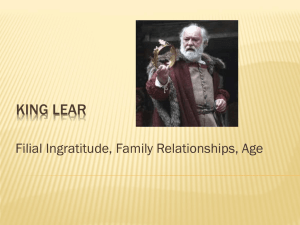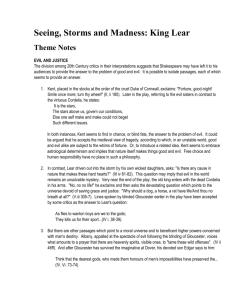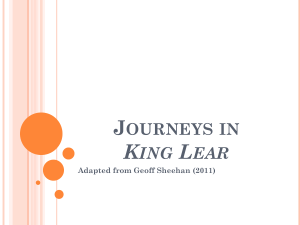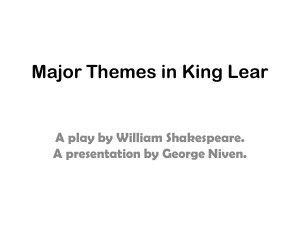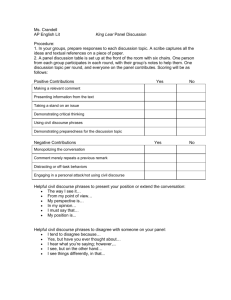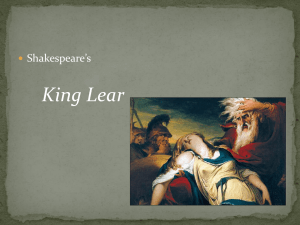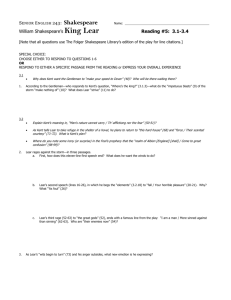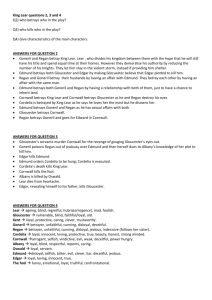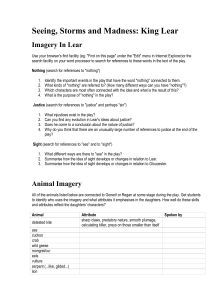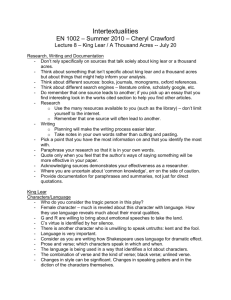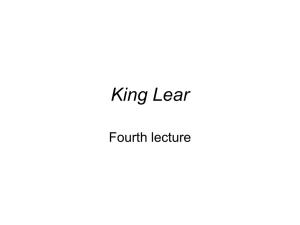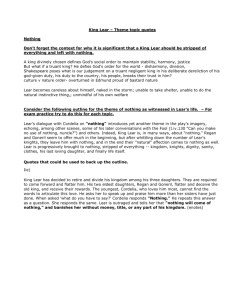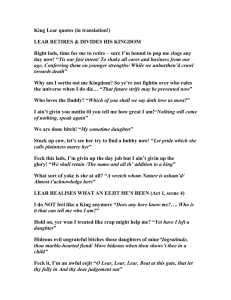Outlines for King Lear Essay
advertisement
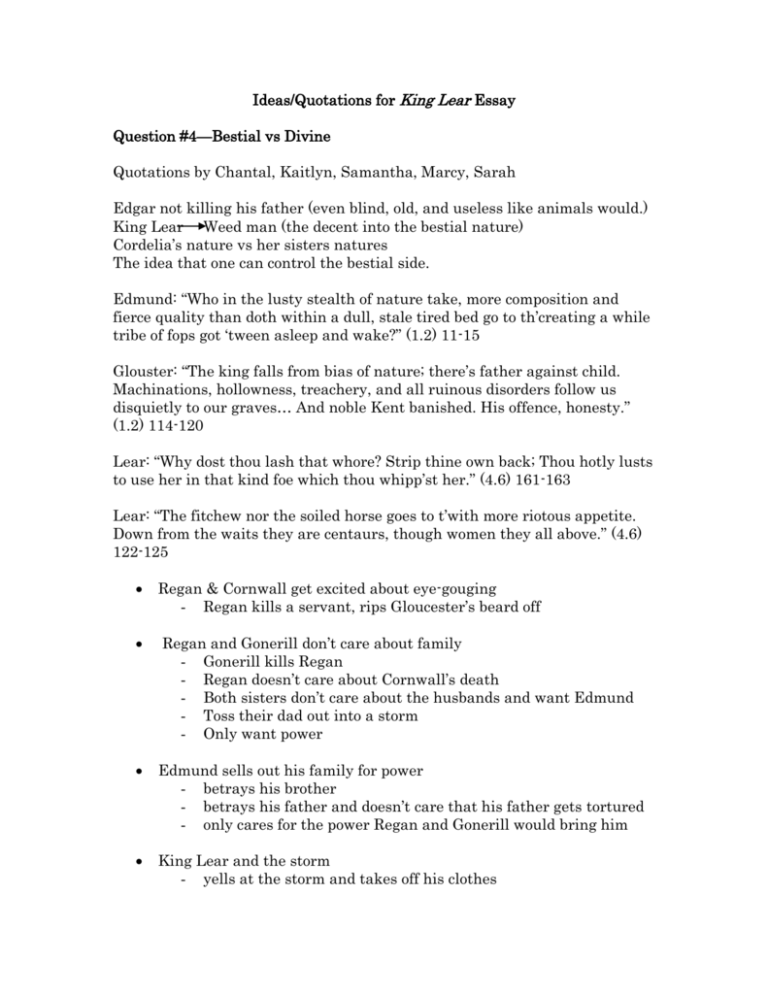
Ideas/Quotations for King Lear Essay Question #4—Bestial vs Divine Quotations by Chantal, Kaitlyn, Samantha, Marcy, Sarah Edgar not killing his father (even blind, old, and useless like animals would.) King Lear Weed man (the decent into the bestial nature) Cordelia’s nature vs her sisters natures The idea that one can control the bestial side. Edmund: “Who in the lusty stealth of nature take, more composition and fierce quality than doth within a dull, stale tired bed go to th’creating a while tribe of fops got ‘tween asleep and wake?” (1.2) 11-15 Glouster: “The king falls from bias of nature; there’s father against child. Machinations, hollowness, treachery, and all ruinous disorders follow us disquietly to our graves… And noble Kent banished. His offence, honesty.” (1.2) 114-120 Lear: “Why dost thou lash that whore? Strip thine own back; Thou hotly lusts to use her in that kind foe which thou whipp’st her.” (4.6) 161-163 Lear: “The fitchew nor the soiled horse goes to t’with more riotous appetite. Down from the waits they are centaurs, though women they all above.” (4.6) 122-125 Regan & Cornwall get excited about eye-gouging - Regan kills a servant, rips Gloucester’s beard off Regan and Gonerill don’t care about family - Gonerill kills Regan - Regan doesn’t care about Cornwall’s death - Both sisters don’t care about the husbands and want Edmund - Toss their dad out into a storm - Only want power Edmund sells out his family for power - betrays his brother - betrays his father and doesn’t care that his father gets tortured - only cares for the power Regan and Gonerill would bring him King Lear and the storm - yells at the storm and takes off his clothes - “Unaccommodated man is no / More but such a poor, bare, forked animal is thou art.” – Lear III.iv. Edgar’s disguise - he takes off his clothes and acts mad and no one recognizes him - dirty and naked and living in a hut - Cordelia as divine - “Fairest Cordelia, that art most rich, being poor / Most choice, forsaken and most loved, despised / Be it lawful I take up what’s cast away.” – France I.i - She’s still going to go to war for Lear despite being cast out by him - Cordelia and Lear are re-united and he begins to lose his madness - Cordelia dies at the end almost like a sacrifice - “There she shook / The holy water from her heavenly eyes, / And clamour moistened; then away she started / To deal with grief alone.” – Gentleman IV. Iii Greek Tragedy Genre -tragedy" refers primarily to tragic drama -literary composition -Performed by actors in which a central character called a tragic protagonist or hero suffers some serious misfortune, which is not accidental -Tragedy stresses the vulnerability of human beings whose suffering is brought on by a combination of human and divine actions -undeserved with regard to its harshness -many tragedies end in misery for the characters, there are also tragedies in which a satisfactory solution of the tragic situation is attained. -According to Aristotle, "the plot is the soul of tragedy" and the plot is communicated to the audience primarily by means of words Question #3 Cordelia’s Death -Cordelia is “Christ” figure; dies in play for other’s sins -Regan and Goneril need foil: Cordelia-compare the two to good sister -Death brings up questions of what’s divine and beastial justice “Then poor Cordelia! / And yet not so since I am sure my love’s/ More ponderous than my tongue” (1.1.76-78) -Cordelia cannot express her love through words; she does love Lear but is still exiled. Her death brings up the fact that she sacrificed her land, power and life to avoid “sucking up” to Lear. -Cordelia is virtuous while other characters like Edmund oand her sisters are sinful. She displayed grace when provoked and didn’t sought vindication. Edmund was vindictive and wanted to bring down others to make himself feel better. Her death would bring reality to the play as it would be logical for her to die at Edmund’s command. Cruelty Cordelia who loved him most is expelled from the kingdom Kent’s loyalty is rewarded with banishment Edgar who is a loyal son of Gloucester is banished for the actions of Edmund Gloucester is blinded and tortured Cordelia is hanged through no wrong of her own Justice Storm to strip illusions from Kent Madness to convolute just characters hoodwinked by humanity Edgar lives and presumably thrives after the play The fool is given greater insight than advisors and kings Banished Kent paired with Lear, banished Edgar paired with Gloucester Neither Lear nor Gloucester can see their most trustworthy friend “Like wanton boys they kill us for their pleasure” “The Gods are cruel in their indifference” Blindness Kayla and Nikki 1. King Lear didn’t see who truly loved him. He only saw what he wanted to see. Line 96: “Mend your speech a little/lest you may mar your fortunes.” Cordelia told him she loved him because he was her father, while her sisters just said pretty things for selfish reasons. 2. King Lear is blind to where his power comes from. He thinks it’s because people like him, but only because he is king. Once his daughters strip him of power, nobody supports him except the people who love him. Line 833: “He may enguard his dotage with their powers/And hold our lives in mercy.” His daughters are now ruling the kingdom, but they let him have 100 knights so he would still feel important. 3. Gloucester is blind as to which son truly loves him. Edmund has set Gloucester and Edgar against each other, and made himself look noble, when he is a true villain. Line 192: “A credulous father, and a brother noble,/ Whose nature is so far from doing harms/That he suspects none;” 4. Gloucester realizes that when he could see, he didn’t know the truth, but after he is blinded he understands where he went wrong. Line 19: “I stumbled when I saw.” 5. At the hut in the storm, Kent, Lear, and Gloucester are blind to Edgar’s identity because their expectations are for Edgar to be noble, not a poor madman. Line 50: “Who gives anything to poor Tom?” Line 20-21: “Enforce their charity. Poor Turlygod, Poor Tom, / That’s something yet: Edgar I nothing am.” 6. Kent was banished by Lear, but returned in disguise so he could still help Lear. Lear was blind to Kent’s identity. Line 1-4: “If but as well I other accents borrow/ That can my speech defuse, my good intent/ May carry through itself to that full issue/For which I razed my likeness.” Pg. 132, Gloucester: “I have no way and therefore want no eyes.” Pg.139, Albany: “But, O poor Gloucester! Lost he his other eye?” Pg. 146, Edgar: “Why then your other senses grow imperfect/ By your eyes’ anguish.” Pg. 152, Gloucester: “What, with the case of eyes” Lear: “O, ho, are you there with me? No eyes in your head, nor no money in your purse? Your eyes are in a heavy case, your purse in a light, yet you see how this world goes.” Gloucester: “I see it feelingly.” Pg. 45, Kent: “See better Lear, and let still remain the true blank of thine eye.” Betrayal versus Loyalty Miranda D. “ the bow is bent and drawn. Make from the shaft… Kent on thy life, no more.’’ (Act 1, Scene 1 Line 143, 155, 158) “See better Lear, and let me still remain, the true blank of thyne eyes’’ (Act 1, Scene 1, Line 159) “Royal Lear/ whom I have honored as my king/ loved as my father, as my master followed,/ as my great patrons thought on in my prayers’’ (Act 1, Scene 1 Line 139) “Be Kent unmannerly/ when Lear is mad… Think’st though that duty shall have dread to speak/ When power to flattery bow? To plainness honor’s/ bound’’ (Act 1, Scene 1)

